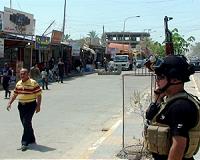| . |  |
. |
Baghdad (AFP) April 15, 2011 Anti-government protesters and sports officials in Baghdad formed an unlikely team on Friday, complaining about new rules banning street rallies in the capital. The recently announced regulations, which allow demonstrations in Baghdad only at three football stadiums, were ostensibly put in place after shopkeepers in the city's main Tahrir Square complained they were losing trade during weekly protests since late February. "Why should we go to Al-Shaab stadium?" shouted 48-year-old Mohammed Abdul Amir, referring to Iraq's national football grounds. "Are we going to play a football match with the police?" "No," he exclaimed during a rally at Tahrir Square. "We will demonstrate here!" The 200-odd protesters angrily flouting the new rules gathered inside a cordon surrounded by Iraqi soldiers, with all demonstrators and journalists frisked by security forces before entering. "Today we broke the rules by coming here, because we regard this place as the parliament of the Iraqi people," said Hasna Faraj, a schoolteacher. "We will not listen to them (the authorities) -- we want to get rid of them." Baghdad security spokesman Major General Qassim Atta announced on Wednesday that officials had barred street protests in the capital, restricting demonstrations to three stadiums. The decision comes after regular rallies in the city against government corruption, unemployment and poor basic services, although Atta also cited complaints by shopkeepers who were losing business because security forces closed off Tahrir Square during demonstrations. "If the main reason for protesting is for your voice to reach the officials and the government, then it would be the same whether you protested in Tahrir or anywhere else," said Kadhim Laftah, 38, who runs a photography shop on the square. "Fridays, being holidays, give us a lot of sales, because lots of people come in. But since the protests started, we have lost a lot of business." Laftah said Atta had come into his shop and asked for his reaction to the proposed relocation, and he responded positively. A restaurant owner on a road to Tahrir Square said that his own trade had not been affected by the weeks of protests, but he was concerned for fellow shopkeepers who were losing business. "The decision is good," said Abu Haidar, the owner of the Al-Nafaq (The Taste) restaurant. "The shops on the square were closing during the demonstrations, it is good for them." Iraqis have staged regular protests since late February around the country, from the Kurdish north to the Shiite south, as demonstrations have swept across the Middle East. More than eight years after the US-led invasion that ousted dictator Saddam Hussein, Iraqis subsist on around three hours of mains power per day, filling the gap with expensive generators, and most also lack clean water. Even though the new rules were announced on Iraqiya state TV on Wednesday, no protesters showed up at Al-Shaab stadium, around a 10-minute drive from Tahrir Square, according to grounds supervisor Kadhim al-Daraji. Daraji, who runs the 45,000-capacity stadium, said he favoured the new rules, but that crowds of protesters at a football stadium could also damage the infrastructure and facilities. "If 2,000 demonstrators came here they would destroy the grounds," Daraji said on the edge of the pitch as Air Force warmed up for a local league match against Karbala. "There could be damage to the stadium and the grounds -- it would be better for us if protests and demonstrations were held in big squares or public parks," Daraji said. "That being said, if demonstrators do come, we have some grounds outside where they can gather, and they can come anytime -- we have toilets, services, everything." "But all over the world," he added, "politics should be kept away from sports."
Share This Article With Planet Earth
Related Links Iraq: The first technology war of the 21st century
 UN says 34 killed at Iranian exiles camp in Iraq
UN says 34 killed at Iranian exiles camp in IraqUnited Nations (AFP) April 14, 2011 At least 34 people were killed and dozens wounded at an Iranian exiles' camp raided by the Iraqi military last week, the United Nations said Thursday. The toll was released the day after UN observers visited Camp Ashraf, north of Baghdad in Diyala province, which the Iraqi government has demanded be closed by the end of the year. "We are aware of 34 bodies at Camp Ashraf and nearby," dep ... read more |
|
| The content herein, unless otherwise known to be public domain, are Copyright 1995-2010 - SpaceDaily. AFP and UPI Wire Stories are copyright Agence France-Presse and United Press International. ESA Portal Reports are copyright European Space Agency. All NASA sourced material is public domain. Additional copyrights may apply in whole or part to other bona fide parties. Advertising does not imply endorsement,agreement or approval of any opinions, statements or information provided by SpaceDaily on any Web page published or hosted by SpaceDaily. Privacy Statement |